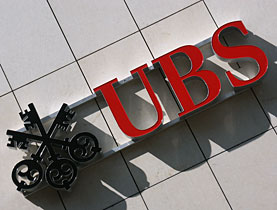Liechtenstein deal further raises tax pressure

A deal struck between Liechtenstein and the United States to lift the veil of banking secrecy on suspected tax evaders could have repercussions for Switzerland.
Observers believe Swiss banks will now come under mounting pressure to give other countries more information on tax dodgers. But banking insiders insist Liechtenstein’s move will not affect Switzerland.
The principality of Liechtenstein, which borders Switzerland, ended two years of negotiations on Monday by signing a deal to grant US authorities access to confidential client data in certain cases of tax evasion investigations.
“For the purpose of this agreement there is no distinction between tax fraud and tax evasion,” said Liechtenstein government spokesman, Max Hohenberg.
This blurring of lines between fraud and evasion was a significant about turn. Like Switzerland, Liechtenstein counts evasion as a civil, rather than criminal, offence and would previously only divulge sensitive information if there was strong evidence of fraud.
The US tax authorities are currently investigating the role of Swiss bank UBS in allegedly helping its citizens to avoid paying duties. Incoming US President Barack Obama was one of three senators behind the “Stop Tax Haven Abuse Act”.
Agreements enough
But the Swiss Bankers Association was quick to play down the significance of the Liechtenstein deal. Spokesman Thomas Sutter said the agreement was only necessary because, unlike Switzerland, Liechtenstein did not have a double taxation treaty with the US.
“This was a decision for Liechtenstein that has no bearing on Switzerland. Switzerland has more than 60 double taxation agreements with other countries and is better integrated with the world,” he told swissinfo.
“Switzerland’s double taxation agreement with the US already outlines measures to exchange information on tax matters. We have not had any official complaints about this.”
This treaty contains an annex that details how and when Swiss banks would cooperate in cases of tax fraud “and the like”.
However, Swiss pressure group Berne Declaration believes the US is likely to demand further concessions from Switzerland after the authorities indicted a top UBS executive on conspiracy to aid tax evasion.
Strange legal distinction
“The Liechtenstein deal represents the future for Switzerland. We believe Switzerland will have to adopt similar measures in the coming months or years,” spokesman Andreas Missback told swissinfo.
“With a pro-tax administration coming into office in the US, we assume that more pressure will be brought to bear to give greater judiciary and administrative assistance in cases of tax evasion.”
Earlier this year, Swiss banking expert professor Teodoro Cocca told swissinfo that it was inevitable that Switzerland would have to change its stance following pressure from the US and other countries such as Germany and France.
“Ten years ago, it was accepted that there were a few offshore centres acting as safe havens for tax evaders. But the world has changed and in today’s global village it is dangerous to stand out with different laws,” he said.
“Sooner or later Switzerland’s strange legal distinction between tax evasion and tax fraud will have to disappear or be amended.”
swissinfo, Matthew Allen in Zurich
Liechtenstein’s agreement to impart information to the US in certain cases of tax evasion ended two years of negotiations. The US authorities must supply evidence of evasion and the name of the suspected party.
The agreement will enter into force on January 1, 2010, and will only apply to select investigations from 2009 onwards.
The principality is already on the Organisation for Economic Cooperation and Development (OECD) blacklist of “uncooperative” tax havens for failing to have adequate agreements that lift the veil of banking secrecy to other countries.
In February, the German authorities launched a tax fraud investigation after receiving confidential information about clients at a Liechtenstein bank. The case resulted in a diplomatic row between the two sides.
People wishing to dodge paying taxes on their assets can do so by three means: avoidance, evasion and fraud.
Avoidance is the legitimate means of structuring finances so they don’t fall under the scope of taxable assets. This can be done, for example, by setting up a trust fund or by changing country residence or nationality.
Evasion is the deliberate concealing the true state of assets from the tax authorities – in other words, lying about the extent of your assets. This is a civil offence in Switzerland and some other countries, such as Austria and Liechtenstein, but criminal in most states.
The main distinction between evasion and fraud is that the perpetrator tells lies on official documentation. Unless tax fraud can be proved, Swiss banks are not obliged to hand over details of client assets to investigators. In some cases this information is needed before fraud can be established in the first place.

In compliance with the JTI standards
More: SWI swissinfo.ch certified by the Journalism Trust Initiative




You can find an overview of ongoing debates with our journalists here . Please join us!
If you want to start a conversation about a topic raised in this article or want to report factual errors, email us at english@swissinfo.ch.